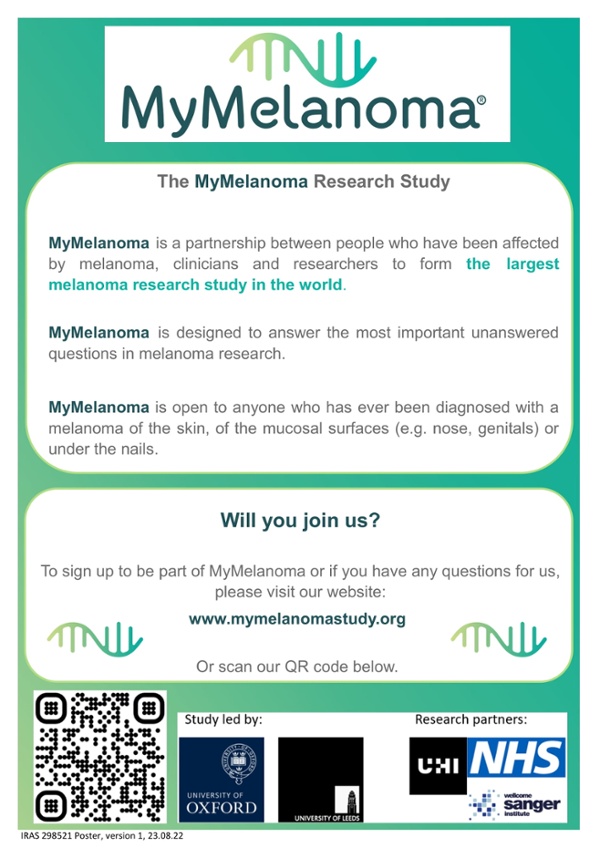If you are being treated in the NHS you may be asked to take part in a clinical study.
Clinical trials are research studies that involve patients or healthy people and are designed to test new treatments. A clinical study is research using human participants to help experts learn about different medical conditions and treatments. There are two primary types of clinical studies: clinical trials and observational studies. Both are designed to help health care professionals expand their knowledge of viable treatment—or preventative—options for patients, including medications, medical devices, surgery techniques, and therapies (e.g. radiation). Clinical studies may also focus on the development of diagnostic tools to help detect or prevent diseases and other medical conditions.
Clinical studies are important for discovering new treatments for diseases, as well as new ways to detect, diagnose, and reduce the chance of developing the disease. Clinical trials can show researchers what does and doesn’t work in humans that cannot be learned in the laboratory or in animals. Clinical trials also help doctors decide if the side effects of a new treatment are acceptable when weighed against the potential benefits.
Clinical trials aim to:
- Find the best ways to prevent disease and reduce the number of people who become ill
- Treat illness to improve survival or increase the number of people cured
- Improve the quality of life for people living with illness, including reducing symptoms of disease or the side effects of other treatments, such as cancer chemotherapy
- Diagnose diseases and health problems.
While clinical trials are important, the choice to participate in one is very personal and depends on your unique situation. You and your doctor need to weigh the benefits against the risks and decide what’s best for you, when presented with a clinical trial.
What Clinical Trials are we currently running?
GEDACNE Trial
This phase III study aims to assess the effectiveness and safety of a gel treatment ( N-Acetyl-GED-0507-34-LEVO gel 5%), in comparison to a placebo gel, applied once daily for 12 weeks in patients with acne vulgaris.
Patients aged >9 and <50 are eligible to participate and have been invited by letter to contact the practice.
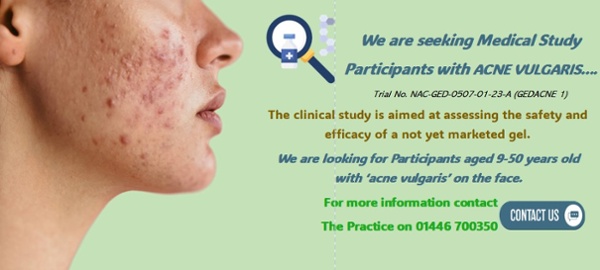
Synexus Obesity Trial
Do you struggle with weight-related health issues? Synexus is enrolling adults 18 years+ with a high Body Mass Index (BMI) and weight-related health issues such as cardiovascular disease (CVD) and Chronic Kidney Disease (CKD) for clinical trials assessing investigational medication on obesity and heart disease.
By volunteering for this trial, you can help to advance this important research for generations to come.
If eligible to participate, you may reiieve compensation for your time and reimbursement for travel expenses. Call 02920 764455 and quote reference: 11117730
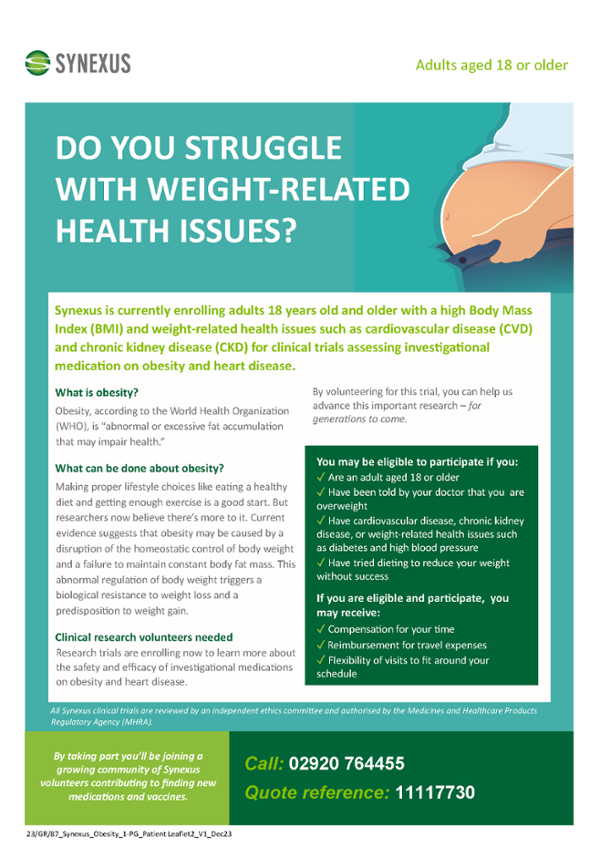
What Clinical Studies are we currently running?
ReStore Study
We are supporting stroke research conducted by the University of Warwick  The research team are looking for adults who have a history of stroke to take part in a new study about online rehabilitation exercise and support (ReSTORe) done at home.
The research team are looking for adults who have a history of stroke to take part in a new study about online rehabilitation exercise and support (ReSTORe) done at home.
After a stroke, many people have long-term health problems that can affect their quality of life. These problems can affect physical, emotional, and social wellbeing. Fatigue, worry and low mood, as well as low fitness, energy and confidence are common issues. The research team want to find out if a stroke rehabilitation programme, supervised by trained staff and delivered online to people living at home, can help people with long-term problems after a stroke feel better.
To find out more about the study, please scan the QR code below with your mobile or visit the web link: https://warwick.ac.uk/restorestudy
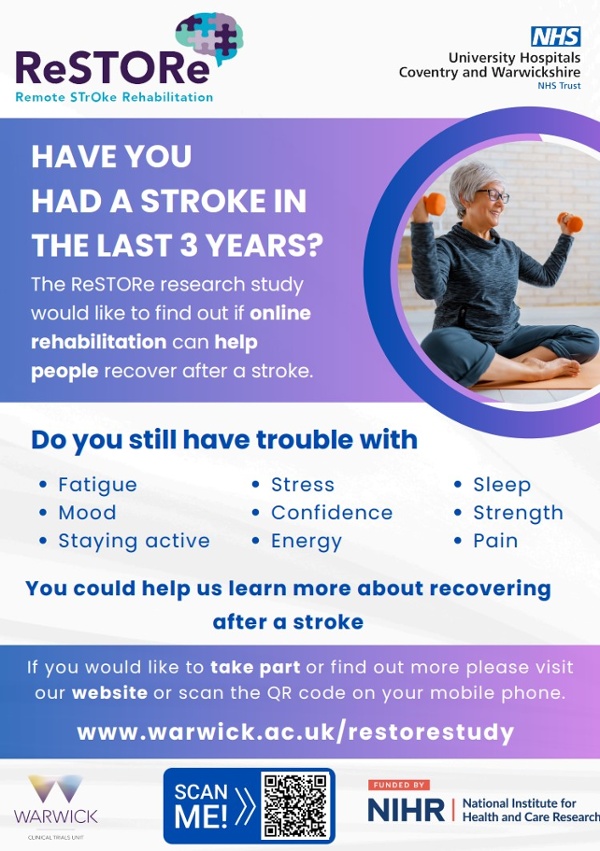
HIE-Connect Study
The HIE-CONNECT study investigates the brain development of healthy babies in comparison to the brain development of babies who suffered a lack of oxygen around birth (hypoxic�ischaemic encephalopathy, HIE). These babies are more likely to have learning and physical difficulties later in life.
To hear more about HIE-Connect or if you have questions about the study, please contact the research team at hieconnect-study@bristol.ac.uk.
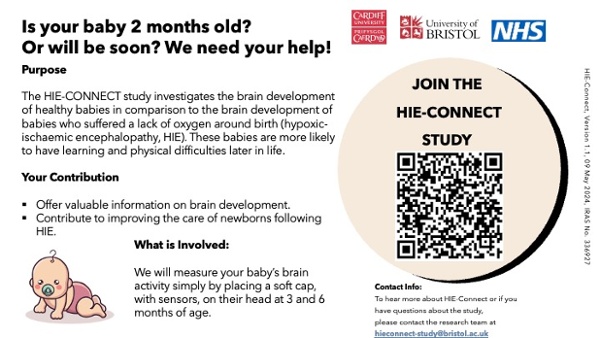
TipToe Study
Do you know someone aged 65+ who lives with knee/hip pain? They could be eligible to take part in a research study to help improve their quality of life.
In the TIPTOE study we will test a personalised self-management treatment in 824 adults aged 70+ living with Osteoarthritis and at least one other medical condition in the community. Participants will be encouraged to take part with a friend, family member or carer who can support them. This treatment will involve up to six, one-to-one consultations with a health practitioner trained in self-management.
Find out more www.TIPTOE.org.uk or email TIPTOE@cardiff.ac.uk
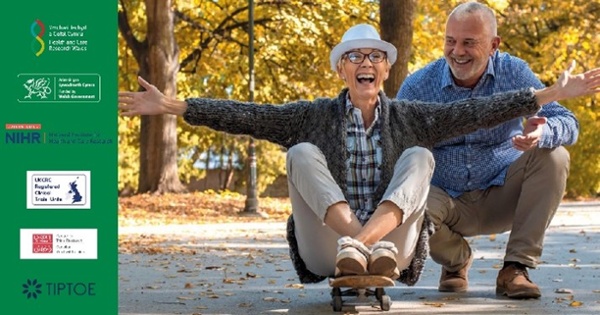
Elsa Study
The ELSA study is screening children, aged 3-13 years to find out their risk of type 1 diabetes. This is a simple finger stick blood test, you can do at home or in the community (school, general practice).
Children at high risk can be monitored and could enter research studies aiming to delay the start of type 1 diabetes. Every family who takes part is helping us to understand more about type 1 diabetes.
For more information, please see the online information tool here: https://elsa.digitrial.com/ You can contact them by email: elsa@contacts.bham.ac.uk or phone: 0121 414 7814.
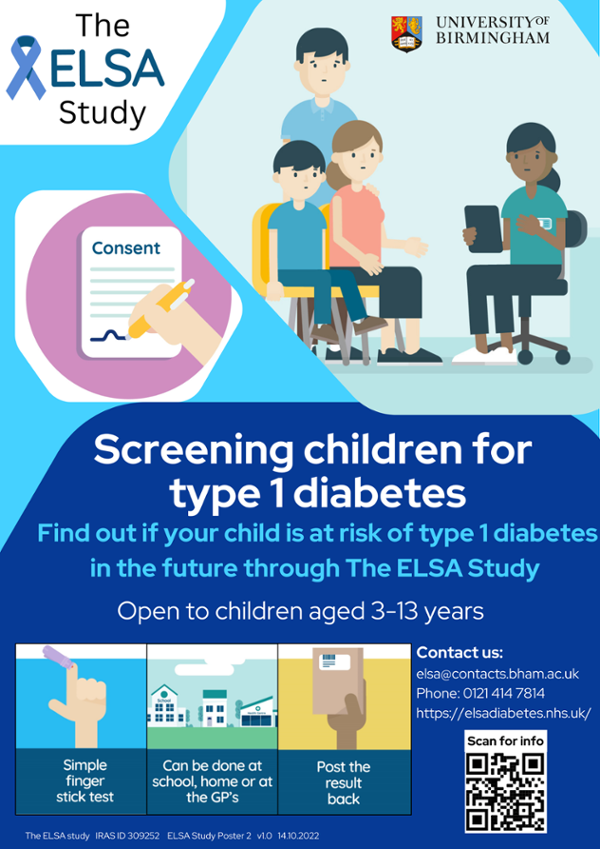
MyMelanoma Study
The MyMelanoma Research Study is designed to answer the most important unanswered questions in melanoma research. This study is open to anyone who has ever been diagnosed with a melanoma of the skin, mucosal surfaces (e.g. nose, genitals) or under the nails.
For more information on this study, and to take part if eligible, simply visit www.mymelanomastudy.org.
